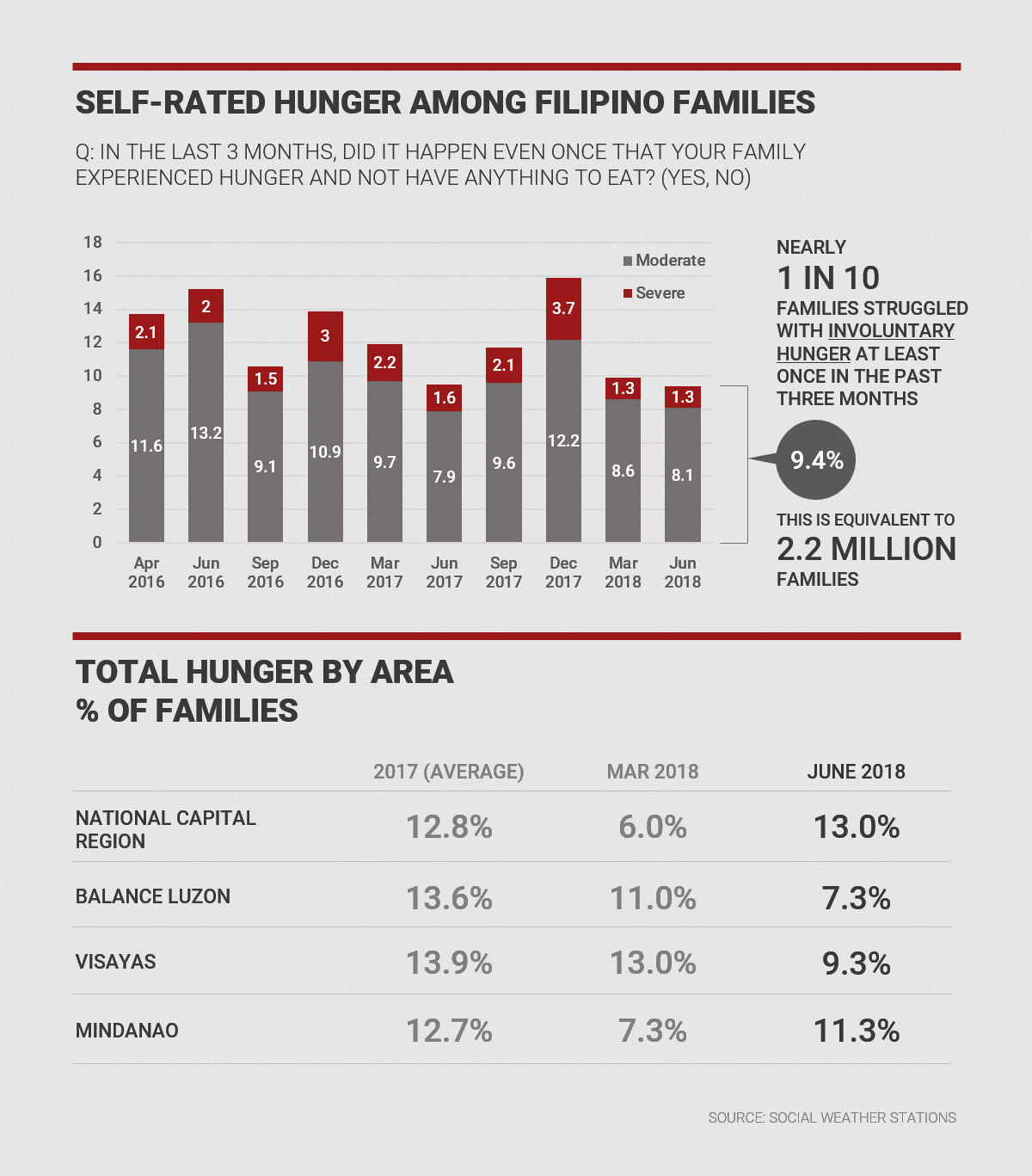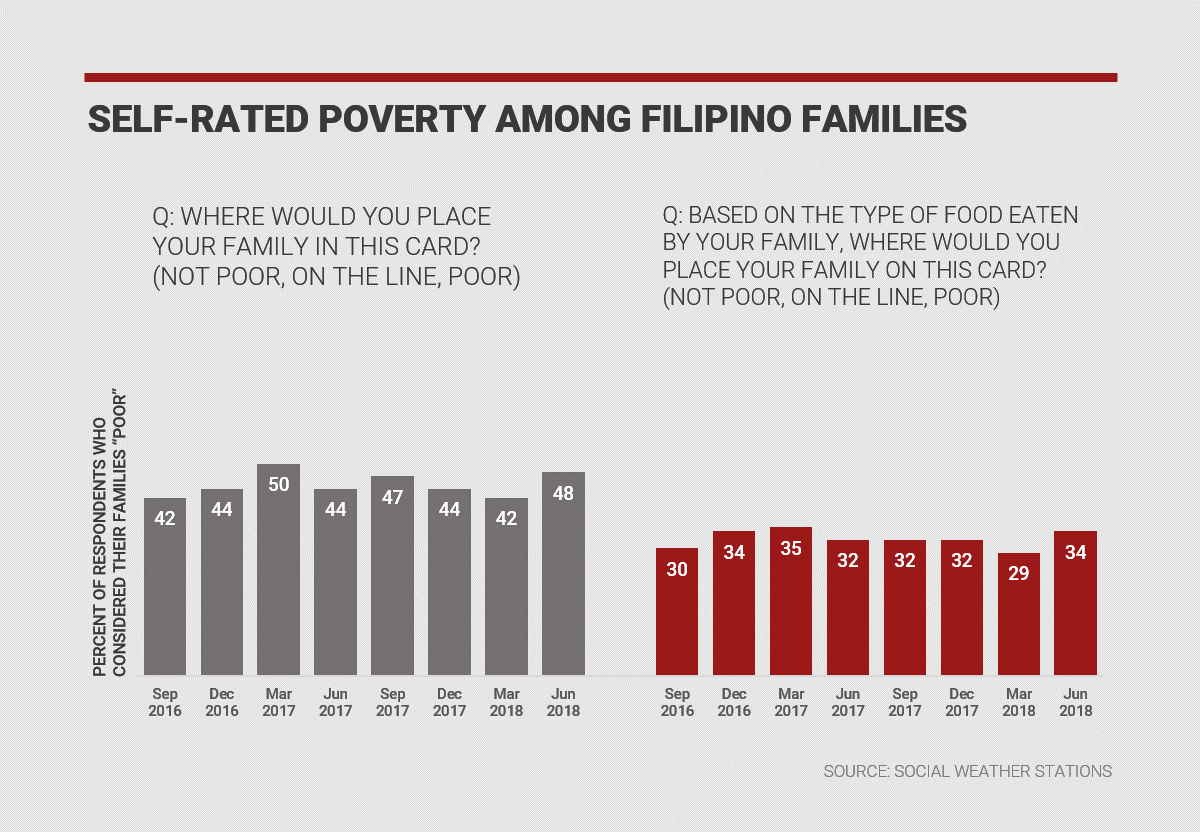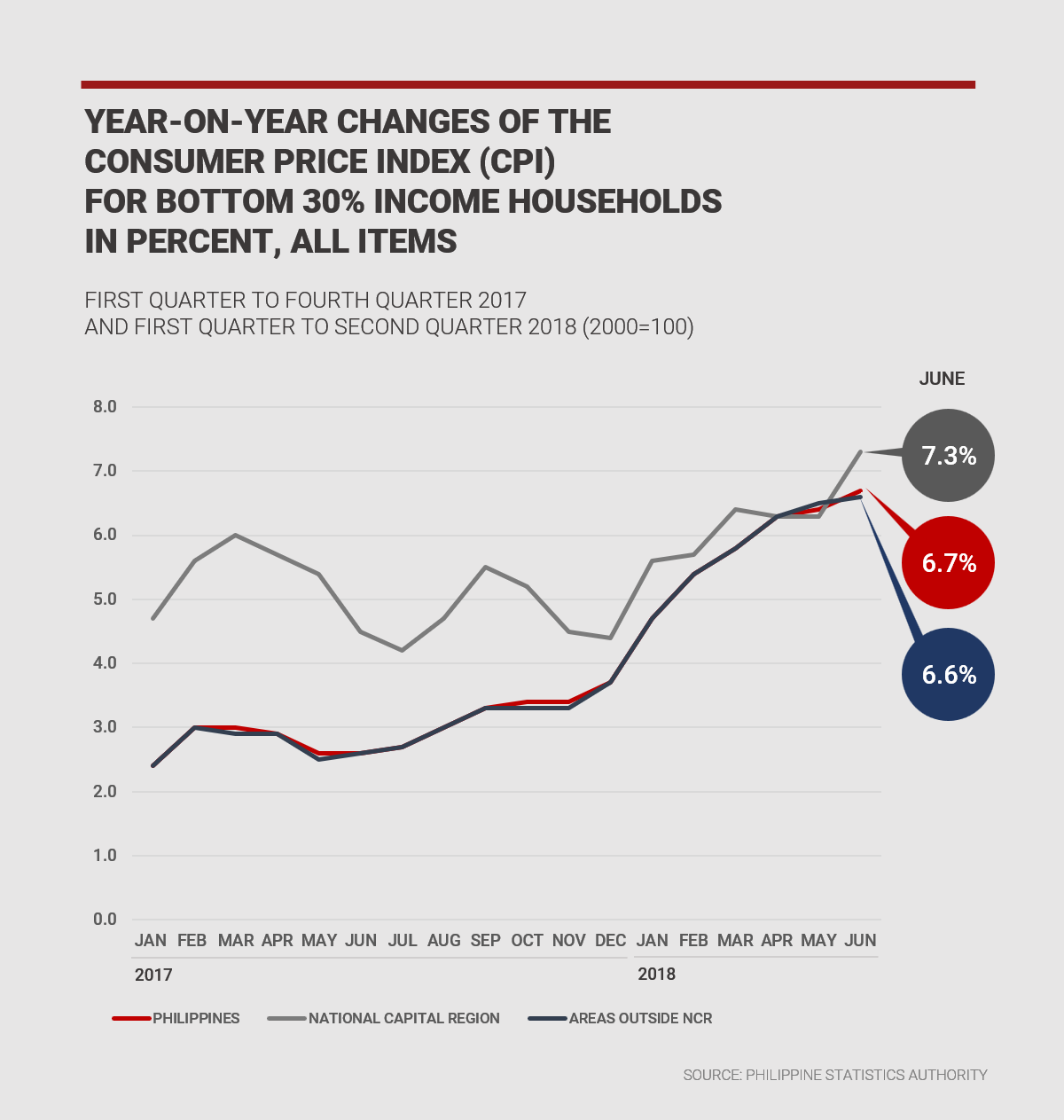Latest surveys show that although the families who reported to have experienced involuntary hunger slightly went down, adult joblessness rate and self-rated poverty in the country increased. Government agencies tasked to address poverty in the country have launched programs such as NAPC’s Kilos SAMBAYANAN, and DSWD’s Pantawid Pamilyang Pilipino Program (4Ps) which is hoped to be institutionalized through a bill filed in the House of Representatives. Meanwhile, the TRAIN law, envisioned by the administration to help reduce poverty in the country, is being criticized by some academicians and experts as being regressive and harmful to the poor. The recorded rapid increase of inflation rate in the country, although not solely attributable to the TRAIN law, will have adverse effects on the poor.
Updated as of July 31, 2018
CATHOLIC SOCIAL PRINCIPLE:
Integral Development Based on Human Dignity and Solidarity
Public policy and government programs must promote development that not only fulfills the material needs of citizens, but also affirms human dignity and freedom, integrity in governance, national sovereignty, and the spiritual dimension of human beings.
The government has drawn up a long-term economic and development plan (Philippine Development Plan 2017-2020) anchored on “AmBisyon Natin 2040”, which “represents the long-term vision and aspirations of the Filipino people for themselves and for the county in the next 25 years.” On October 11, 2016, the President signed Executive Order (EO) 5 adopting Ambisyon Natin 2040 in which the Philippine government’s over-all long-term goal is to “triple real per capita and eradicate hunger and poverty by 2040, if not sooner.”
On July 16, 2017, the National Anti-Poverty Commission (NAPC) launched the Kilos SAMBAYANAN (Kilos para sa Sampung Batayang Pangangailangan), dubbed as the flagship anti-poverty reduction program of the commission. It aims to focus on the ten basic needs of poor Filipinos such as food, land reform, water, shelter, work and national industrialization, healthcare, education, social protection, healthy environment, peace, and people’s participation. According to the NAPC, Kilos SAMBAYANAN “is a call for convergence and a commitment among all sectors of society to address poverty across its many dimensions. It also represents the ultimate measuring of the impact of government programs on the lives of the poor.”
The Social Weather Stations (SWS) Second Quarter Survey 2018 found that 9.4% or an estimated 2.2 million families experienced involuntary hunger at least once in the past three months. This is a 0.5-point decrease from the 9.9% families in March 2018.

Despite the slight decrease in the hunger rate found in the SWS Second Quarter Survey 2018, 48% of Filipino families (or about 11.1 million families) considered themselves poor in June 2018. It is a 6-point increase from the 42% in March 2018 and the highest since the 50% in March 2017. Of the 48% families who considered themselves poor, 12% transitioned into poverty. On the other hand, of the 52% Filipino families who consider themselves non-poor, half or 26% transitioned out of poverty. While this may sound good, this is 4 points lower than the 30% Filipino families who considered themselves to have escaped poverty in the previous quarter.

The SWS First Quarter 2018 Survey showed an 8.2-point increase in the adult joblessness rate in the country, from 15.7% (around 7.2 million adults) in December 2017 to 23.9% (around 10.9 million adults). This is one point above the adult joblessness rate of the same period last year.
Rice imports of the National Food Authority (NFA) started to arrive in the first week of June 2018 to lower the price of rice which has spiked in the last few months because of dwindling supply due to higher fuel prices and limited stocks of government subsidized rice varieties. Subsidized imported rice, mostly coming from Vietnam and Thailand and being sold at ₱27 to ₱32 per kilo, were made available in the market in various parts of the country (e.g., Bulacan, Cagayan de Oro, Quezon City) at the end of June.
SUGGESTED READING
Food (In)security and the Price of Rice Self-Sufficiency
by Roehlano M. Briones
Philippine Institute for Development Studies (PIDS)
December 2016
In April 2018, an NFA executive from Eastern Visayas admitted that they have stopped distributing NFA rice to retailers since March. Although NFA Council officials denied this, some vendors and consumers insisted on the unavailability of NFA rice. In support to this, the Grains Retailers’ Confederation of the Philippines Inc (Grecon) cited five (5) regions in the country, Ilocos Region, Cagayan Valley, Central Luzon, CALABARZON, and the National Capital Region (NCR), that have no more NFA rice supply. This has serious implications for the poor since an NFA rice costs ₱27 to ₱32 per kilo which is much cheaper than commercial rice priced at an average of ₱52 a kilo. On July 24, 2018 a government news agency reported that the delivery of NFA rice from Thailand allocated for Eastern Visayas provinces had been delayed for two weeks due to inclement weather. Six provinces in the Eastern Visayas region has stopped receiving NFA supply since early this year.
CATHOLIC SOCIAL PRINCIPLE:
Universal Purpose of Earthly Goods and Private Property
Public policy and government programs must reflect the conviction that all the goods of the earth are intended to fulfil the needs of all and to be shared fairly by all. It must recognize that private property has a social dimension, and that the rights of private ownership are limited by the urgent basic needs of others for food, safe and decent housing, and livelihood.
Cabinet secretaries who serve as economic managers and operate from a more neoliberal framework have tended to contest and overrule officials appointed to key departments for the alleviation of poverty and their proposals. For instance, the National Economic and Development Authority (NEDA) opposed the plan of the Department of Agrarian Reform (DAR) to have a two-year moratorium on land conversion.
CATHOLIC SOCIAL PRINCIPLE:
Love of Preference for the Poor
Public policy and government programs must be oriented first of all toward meeting the needs of the most vulnerable and marginalized in society.
After several deferments, the Senate Commission on Appointments rejected the appointment of Judy Taguiwalo as secretary of the Department of Social Welfare and Development (DSWD) and Rafael Mariano as secretary of DAR. The two are known to have love of preference for the poor and a redistributive agenda.
Under the General Appropriations Act (RA No. 10964) or the 2018 National Budget, signed on December 19, 2017, the social services sector continues to get the biggest allocation at 37.8% or ₱1,425.7 billion of the ₱3.767 trillion budget.

The government continues and commits to improve the implementation of social protection programs such as the Pantawid Pamilyang Pilipino Program (4Ps) and Social Pension Program for Indigent Senior Citizens (SPISC), and to design them for the development of self-reliance among the News, however, circulated that the 4Ps is about to end in 2019, simultaneous with the ending counterpart financing of the World Bank in the program. Former DSWD Sec. Taguiwalo clarified that there are no plans to discontinue the program in 2019 but the department continues to conduct the “Kamustahan” or the review of the program to improve its implementation.
In October 2017, the Commission on Audit released its performance audit report of the 4Ps. The report noted that there are 1.3 million household beneficiaries that have transitioned above the poverty line. Reacting to fears that this will lead to the delisting of these beneficiaries, the 4Ps National Director Leonardo Reynoso clarified that there is a need to first finish the validation of the real situation of these beneficiaries and that crossing the poverty line does not necessarily mean that these families are no longer vulnerable.
On January 16, 2018, the House Committee on Poverty Alleviation approved House Bill No. 41,”An Act Institutionalizing the Pantawid Pamilyang Pilipino Program (4Ps) and appropriating funds thereof”
The Department of Agriculture (DA) has approved a measure to enter into a ₱21-billion deal with local rice farmers to produce rice for distribution to beneficiaries of the Pantawid Pamilyang Pilipino Program (4Ps).
4Ps cash grants received through conduits of Land Bank of the Philippines have been delayed due to the unconditional cash transfer (UCT) to be distributed as provisioned in the TRAIN Law. As of April 2018, beneficiaries complained that they have not yet received their December 2017 and January 2018 cash grants.
The first package of the comprehensive tax reform program (CTRP), the Tax Reform for Acceleration and Inclusion or TRAIN, signed into law (Republic Act No. 10963) by President Duterte in December 2017, aims to support the government’s poverty reduction target of 14% in 2022 from 21.6% in 2015. It exempts 4.7 million taxpayers with a net taxable income of ₱250,000 and below from paying income taxes. With this tax reform plan, the rich will have to pay more taxes while poor and low-income Filipinos will pay less income taxes or none at all. The government intends to compensate the vulnerable families for the possible impact of the new law on the prices of basic goods by providing cash grants.
To cushion the impact of the TRAIN Law on the poor’s purchasing power given its temporary “inflationary effects”, the law provides for a three-year Unconditional Cash Transfer (UCT) scheme for around 10 million poor households (4.4 million 4Ps members, 3 million senior-citizen beneficiaries of the Social Pension Program, and 2.6 million households of DSWD’s Listahanan. Beneficiaries are to receive monthly cash subsidies amounting to ₱200 for 2018, and ₱300 for 2019 and 2020. (However, see “shadow” side.)
One of the major provisions of the TRAIN Law is the increase in oil excise taxes. The current rates have not been adjusted since 1997, making the government lose some ₱145 billion in revenues annually. Under the TRAIN Law, rates will be adjusted gradually starting the 2018 to 2020 and will be indexed annually in the succeeding years. The Department of Finance (DOF) argues that fuel excise taxes are progressive because 51% of fuel is consumed by the top 10% of Filipino households, whereas the poorest 50% of Filipino households consume only 13% of total fuel. (However, see “shadow” opposite.)
In his third State of the Nation Address in July 2018 the President warned businesses who take advantage of the increasing prices that greatly affects the poor. He mentioned this after stating the importance of TRAIN Law in achieving sustainable growth for the country and listing the social protection measures provided for the poor and vulnerable sectors of the society. He also called on intelligence and law enforcement agencies to run after such businesses.
The poor are the hardest hit with the passage of the law on TRAIN 1 given that they do not benefit from the reduction in income tax rates but suffer the consequence of increasing prices of goods (e.g., sugar-sweetened beverages) and services. Although the intent to reduce the consumption of sugar-sweetened beverages which are detrimental to health could be achieved, some consumers will continue to buy them and shoulder the higher cost of these products. The impact of price increases to shoppers in supermarkets who belong to the middle and upper classes is lesser and not as immediate compared to the poor or low-income earners who make impulse purchases at the nearby sari-sari It did not help that the release of cash grants by the Department of Social Welfare and Development (DSWD) was delayed by at least four months and was completed only for the 4Ps beneficiaries. It was also only on June 30, 2018 that the agency started the payout for the senior-citizen beneficiaries.
The poor are also affected by increases in transportation costs and other goods due to an increase in fuel taxes. The impact is most felt by the commuting public as the price hike will affect various modes of transportation such as jeepneys and tricycles. To illustrate, transport groups estimate that the excise taxes may compel jeepney operators to raise their fares by 25%. This would make the fuel excise taxes, in effect, regressive. Moreover, in the absence of fare hikes, drivers of public transportation have been carrying the burden of the increasing fuel prices in the past half of the year. Petitions for fare hike and general oil price rollback are pushed by various transport groups. The Land Transportation Franchising and Regulatory Board (LTFRB), for its part, launched the fuel voucher program (or the Pantawid Pasada Program) for jeepney drivers in July. Under the program, debit cards will be issued to jeepney operators subsidizing them ₱5,000 each, to be distributed over the six months (₱833.33 a month until January). The LTFRB has 179,000 jeepney franchise holders on its list. Transport groups dismiss the program as a “band-aid/short-range solution” to the problem, arguing the possibility that some of the funds will go to corruption, that the fund is not enough to cover the 240,000 jeepney drivers in the country, and that the program once failed during the Aquino administration.
Despite these immediate negative effects of the TRAIN Law to the poor, President Duterte defended it, assuring that social protection measures are in place. The DOF also downplayed the impact of the new tax reform measure, particularly the adjustment on excise taxes and additional levies on certain goods that have contributed partly to increases in consumer prices, affecting the bottom 30% income segment the most.

As of July, 2018, the Office of the Vice President’s (OVP) flagship anti-poverty project, Angat Buhay: Partnerships Against Poverty, has benefitted more than 155,000 families across the country through ₱252-million worth of assistance. The anti-poverty program links local government units (LGUs), nongovernment organizations (NGOs), and private corporations to develop projects for housing, infrastructure, education, livelihood, and disaster management. Some of the projects of Angat-Buhay in the first half of 2018 included the distribution of solar lamps to fisherfolk residents of Sumisip, Basilan and stripping machines to the abaca farmers of Piagapo, Lanao del Sur.
CATHOLIC SOCIAL PRINCIPLE:
Value of Human Work
Public policy and government programs must affirm human labor as the most important element of production, establish fair compensation that allows workers to raise families within a decent standard of living, protect the rights of workers to self-organization, and create opportunities for employment and livelihood with dignity.
To assist the 30,000 workers displaced by the closure of Boracay Island, which took effect on April 26, the following government agencies offered jobs and other forms of assistance:
- DOLE promised to provide emergency employment for one month to about 5,000 residents (2,000 of which are members of the indigenous community) to clean up the island. In June, DOLE released ₱14, 578, 592 for the Emergency Employment Program or Tulong Panghanapbuhay sa ating Disadvantaged/ Displaced Workers (TUPAD). It was used to pay the wages of the program’s first batch of beneficiaries, 1,688, for the period April 26 to May 31, 2018. A total of 1,292 workers were hired to be the second batch of TUPAD beneficiaries. Cash assistance is also made available by DOLE to almost 20,000 registered workers and 5,000 informal sector workers. The subsidy for regular employees amounts to ₱4, 205 per month for a period of six months while for part-time workers, ₱6,000 (equivalent to 25% of their 3-month salary) will be provided in lump sum. As of June 29, DOLE Secretary Bello announced that only 3,600 beneficiaries have applied for the cash assistance.
- DPWH hired 40 residents for its road clearing operations.
- DSWD has three programs to help displaced workers in Boracay: Sustainable Livelihood Program (SLP), Assistance to Individuals in Crisis Situations (AICS), and Cash for Work (CFW). As of June, the following were the recorded beneficiaries of the programs: 2,958 residents received the livelihood grant amounting to ₱15,000 each; 10,274 individuals were provided with transportation assistance amounting to ₱24.8 million; 3, 924 individuals were provided with educational assistance amounting to ₱8.8 million; 694 individuals were provided with medical assistance amounting to ₱2.1 million; 8 individuals received burial assistance amounting to ₱37,000; 1,898 individuals were hired under the Cash for Work Program
